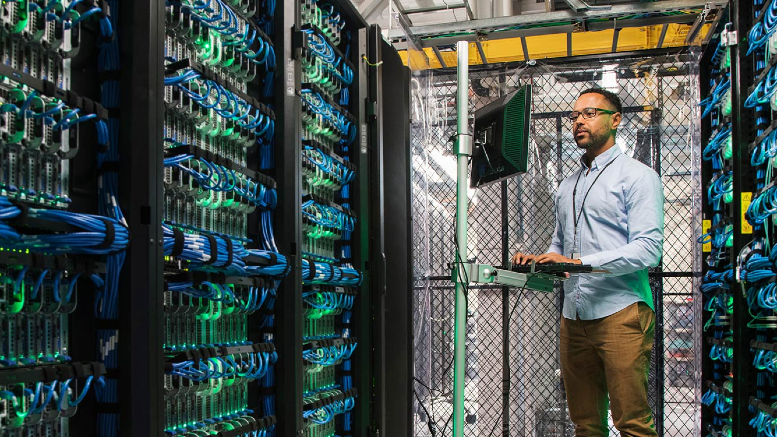Empowering frontline workers with AI to enhance jobs and customer service
February 6, 2025 / Patrycja Sobera
Short on time? Read the key takeaways:
- Successful organizations are using AI to enhance frontline worker capabilities, boosting both job satisfaction and customer service quality.
- While office workers often receive the latest tools, frontline staff frequently face a digital gap that affects their performance.
- Companies achieve better outcomes when frontline workers help shape AI implementation decisions and features.
- Emerging technologies like augmented reality and AI-powered mobile platforms give frontline staff instant access to information, improving service speed and efficiency.
The rapid adoption of AI technology has sparked a debate about its impact on the future of frontline workers, with many assuming the role of field technicians will be replaced by remote, AI-assisted solutions. Yet, rather than eliminating jobs, companies across various industries are leveraging AI to enhance frontline workers’ roles, improving job quality and customer service. Integrating AI into the workforce is about augmentation – empowering employees to perform better, innovate and adapt to an evolving technological landscape.
The role of frontline workers: Overlooked yet essential
Frontline workers – those who interact directly with customers – are often the backbone of retail, healthcare, hospitality and transportation industries. Despite their critical role in delivering products and services, many organizations have failed to prioritize their digital experience. While companies have embraced digital transformation to boost productivity and profitability, these benefits have often been limited to office-based employees, leaving frontline workers behind regarding access to technology, training and resources.
This oversight is particularly concerning because frontline workers are the face of the company, representing it daily in customer interactions. Their ability to deliver high-quality service directly influences customer satisfaction and business success.
AI in the workplace: improving job quality, not replacing workers
One of the primary goals of AI integration is to automate routine tasks, allowing workers to focus on higher-value activities. However, the implementation of AI does not consistently achieve this goal. Often, technology leads the way, with little input from those on the frontline. This “tail wagging the dog” approach has created gaps between technological advancements and the actual needs of employees. As a result, frontline workers have expressed concerns about being pressured to adapt to new technologies without adequate training, fearing job loss if they fail to do so.
A survey by Microsoft revealed that 46% of frontline workers felt pressured to adapt to new technology, and 55% reported having to learn new tools on the fly without proper training. This highlights the need for a more collaborative approach to AI adoption, where workers are empowered to provide input on the tools they use. Instead of viewing AI as a replacement for human labor, companies should see it as a tool to improve job quality. For example, AI can offer real-time coaching, automate administrative tasks and provide instant access to information – all of which save time and improve the worker experience.
Frontline workers who have used AI systems that assist with customer service, such as logging caller details and auto-prompting solutions, report positive outcomes. These technologies can save time and give employees more tools. Importantly, frontline workers are not opposed to AI – provided that it helps them maintain or improve their job quality.
Augmented workforce: AI as a collaborative tool
A successful AI integration strategy begins by acknowledging the unique strengths of human workers. AI should augment – not limit – employees’ capabilities. High-performing organizations are already taking a human-centered approach to workplace design, focusing on how AI can complement human talents like judgment, empathy and creativity. By co-creating technology with the input of their employees, these companies ensure that AI enhances, rather than constrains, the workforce.
Frontline workers are often the first to interact with new technologies in practical settings, making their feedback invaluable for continuous improvement. Their insights can reveal unforeseen issues and missed opportunities in AI systems, helping businesses refine their technological offerings. Implementing AI without frontline input can reduce workers’ ability to exercise their human skills, leading to dissatisfaction and diminished performance. Companies can ensure that AI benefits employees and employers by involving workers early in the development process.
Augmented reality, wearables and AI: The future of frontline work
The Fourth Industrial Revolution, which includes advancements in the Industrial Internet of Things, AI and cyber-physical systems, is transforming the relationship between technology and human workers. In manufacturing, for instance, augmentation technologies like augmented reality (AR), exoskeletons and wearable devices create new opportunities for workers to improve their skills, increase efficiency and enhance safety.
These technologies do more than automate tasks – they empower workers to solve problems more effectively. AR, for example, provides real-time, step-by-step instructions that help technicians troubleshoot equipment or onboard new processes quickly. Wearables can monitor worker health and safety, reducing the risk of injuries on the job. By integrating AI into mobile platforms, companies give frontline workers immediate access to information and tools that improve their performance.
A human-centric future: AI as a tool for empowerment
As AI continues to evolve, the most successful organizations will see AI as a tool to empower their workforce, not replace it. Companies can create a more inclusive, innovative and productive workplace by taking a human-centric approach to technology integration. Augmentation technology, such as collaborative robots, smart workstations and virtual reality platforms, allows workers to develop new skills, increase their well-being and improve safety – all while driving business success.
In industries where innovation and efficiency are crucial, AI is helping to unlock new possibilities. However, the key to successful AI adoption is collaboration between technology and its users. By involving frontline workers in designing and deploying AI systems, companies can ensure that the technology enhances human capabilities rather than replacing them.
As we move into the future, the relationship between AI and frontline workers will continue to evolve, unlocking new productivity levels and customer satisfaction. By empowering frontline workers with the right tools and training, companies can ensure that their employees are ready for the future and active participants in shaping it.
Originally published in The HR Director.





















